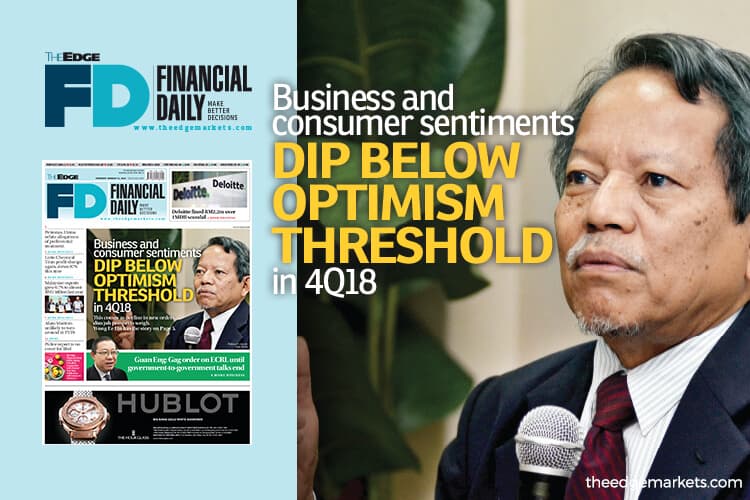
This article first appeared in The Edge Financial Daily on January 31, 2019
KUALA LUMPUR: Malaysia’s business and consumer sentiments continued to slip for the second consecutive quarter in the fourth quarter of 2018 (4Q18).
According to a survey by Malaysian Institute of Economic Research (MIER), the 4Q18 Consumer Sentiments Index (CSI) sank below the threshold of 100 points, recording 96.8 points, while the Business Conditions Index (BCI) slipped to 95.3 points.
Speaking to the press at its fourth quarter 2018 (4Q18) briefing yesterday, MIER executive director Emeritus Professor Dr Zakariah Abdul Rashid explained that the CSI was down as sentiment sagged on job and income conditions, while inflationary expectations edged up.
The survey revealed that the BCI is down in 4Q18 on the back of declines in sales, production, new local orders, new export orders, capital investment and capacity utilisation.
Notably, CSI surged above the 100-point optimism threshold to a 21-year high of 132.9 points in 2Q18 when the 14th general elections were held, while BCI improved to 116.3 points.
Zakariah explained that the indices in 2Q18 are an “overreaction” after the change of government and the sentiment has now began to normalise.
Nevertheless, going forward into 1Q19, Zakariah noted that the BCI is expected to increase marginally.
“Business expectation for 1Q19 is expected to moderate. With the improvement in future export, production is expected to be livelier, prices will stabilise, employment prospects are likely to remain stable and wage trend is expected to increase,” said Zakariah.
Meanwhile, consumers are expecting that hiring activities will remain sluggish and shopping plans will go on prudently for 1Q19, he added.
“Consumers are heading into a new year 2019 with caution and pragmatism,” said MIER in the survey report, adding that lower optimism about the domestic economy and global outlook may likely be undermining the current mood in the local stock market as well.
“And that smaller demand coming from both businesses and consumers clearly does not augur well for the economy in the coming months,” the report added.
Also, Zakariah said MIER is forecasting the country’s gross domestic product (GDP) growth to be at 4.5% in 2019 amid the slower global growth, noting that the domestic demand will still continue to be the engine of growth in 2019.
He added that the GDP growth is expected to pick up a little bit in 2020 in the range between 4.5% and 5.5%.
“The global economy continues to grow at a moderate pace amid a brittle demand and lessened trade flows,” said Zakariah, adding that the uncertainty due to the looming trade war and weakening financial market sentiments poses a risk to the GDP growth.
Furthermore, MIER said the escalating trade tensions together with other emerging concerns, including slower than expected growth in emerging market economies and the US government shutdown, are causing instability in the financial market.
Zakariah, however, noted that a slowdown in external demand is dragging the domestic demand.
“High dependency on private consumption coupled with moderating investment is a concern for future growth,” said Zakariah, noting that consumers will most likely be cautious in spending due to the concern of high cost of living.
While the average headline inflation for 2018 was at 1%, the 2019 headline inflation is anticipated to be higher at the average rate of 2% due to the expansionary policy to support domestic demand and a weak ringgit foreign exchange.
Declining to reveal any projections on ringgit, Zakariah explained that the ringgit is expected to be under pressure due to the short-term capital reversal despite a positive trade balance.
“The ringgit is affected by the volatility of the financial market as short-term investors continuously rebalance their portfolio due to monetary policy differential as well as heightened policy uncertainty among developed nation,” the survey wrote.
On investment growth for 2019, MIER said both the private and public sectors are expected to moderate partly due to the government policy to review selected big-ticket investments in the effort to address the issue of high public debt.
“This has a spill-over effect on private investment, which in turn will have a negative influence on private consumption,” said the report, adding that the slowdown in investment is due to a moderation in global investment flows and a reduced demand for manufacturing goods.